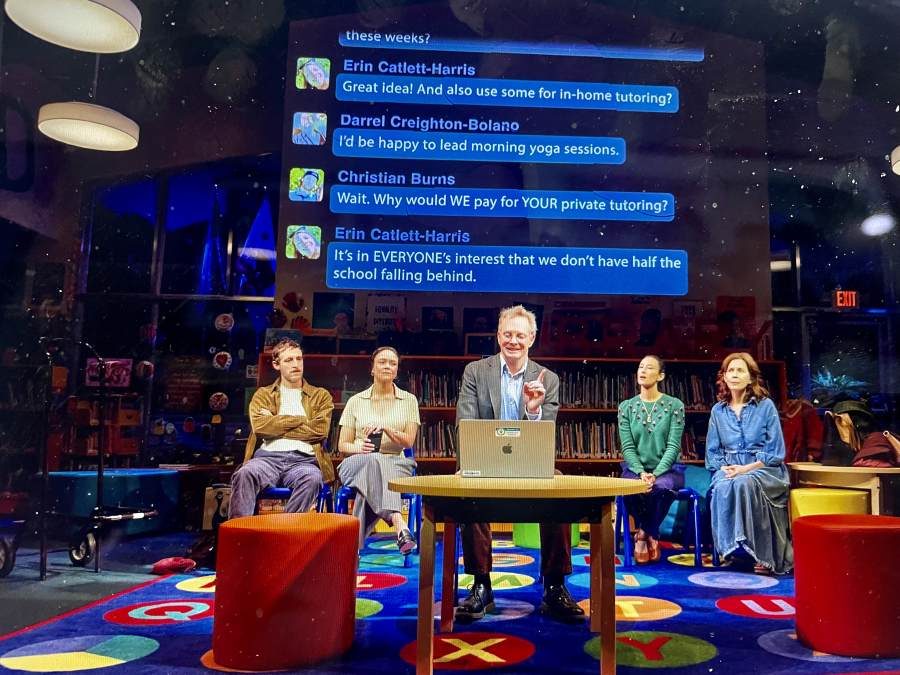

The Board of Directors of Eureka Day school, a private school in upscale Berkeley, California, prizes inclusivity above all else. So no issues will be resolved without complete agreement. “We only make decisions by consensus,” says Meiko, a member of the board.
The group strives to be inclusive and always include the parents of a new student. This time it’s Carina, (Amber Gray) whose son is thriving in the school. A black parent, she represents diversity as does the rest of the group. Thomas Middleditch is Eli, a white stay-at-home dad. He has an open marriage and is having an affair with Meiko, (Chelsea Yakura-Kurtz,) an Asian single mother.
The senior member is Suzanne, (Jessica Hecht) a founder of the school that began with only 15 families. A bit older, she has had several children who’ve gone through the school. Hecht plays a stereotypical role for her, a little dithering, sometimes searching for words but always conciliatory. The key for her is making everyone involved happy. She also has a backstory that we learn later.
The Board espouses liberal values and when they address one another, they are so full of liberal- speak that their conversations are vague and pretentious, as well as a source of humor for the audience.
Anna D. Shapiro does a fine job directing her skilled cast. The meetings are led by Don (Bill Irwin) who is the head of the school and a calming presence.The pivotal event occurs when one child gets the mumps and the Health Department intervenes, closing the school for a while and strongly recommending all children be vaccinated. The tensions build as the board begins to discuss the merits of vaccines.
Suddenly the parents’ attitudes become a contentious issue. Should the school require the vaccine or not?
In the spirit of inclusivity which is the catch-all word, the group holds a “Community Activated Conversation,” on zoom while the board is present in the school library. As the members talk with one another, parents at home share messages with the group. At first benign and humorous, they grow increasingly funny and even hostile. The audience at the Samuel J.Friedman Theatre was so hysterical that we couldn’t hear the actors on stage. But that didn't matter to us. If you ever participated on a zoom while people were private messaging one another or everyone, you appreciated the scene.
The simple setting by Todd Rosenthal is the school library designed in primary colors with book posters promoting social justice. The large adults look a bit silly wedged into the small chairs meant for children. (Yet don’t we see the school parents acting somewhat childish on the community zoom?)
Then the play suddenly shifts abruptly from the hysterical scene onstage to a somber one when Eli’s son catches the mumps from Meiko’s daughter and winds up hospitalized. The tone stays serious as Suzanne shares her story with Carina about losing her young child. She blames the death on the vaccines the girl received as an infant.
Jonathan Spector's story is so timely that it is eerie. The uber-liberal parents are one thing, but the controversy about requiring vaccines is taken right out of the news, given the likelihood of anti-vaxxer Robert Kennedy Jr. becoming United States Secretary of Health and Human Services.
What is one person’s responsibility to another? Meiko’s unvaccinated child spreads the mumps to another child and several children become sick.Soon many parents sign a petition demanding that the MMR vaccine be required for school attendance. If not, they threaten to withdraw their children and financial support from the school.
Suddenly it isn’t about personal choice or inclusivity. Not is it really about liberal values. The play’s conclusion leaves the audience with a bit of surprise at its neat ending.
We’ve laughed, we’ve pondered, we considered, but much as it would be nice, we realize that you can’t please everyone.
Samuel J. Friedman Theatre
261 West 47th Street
New York, NY